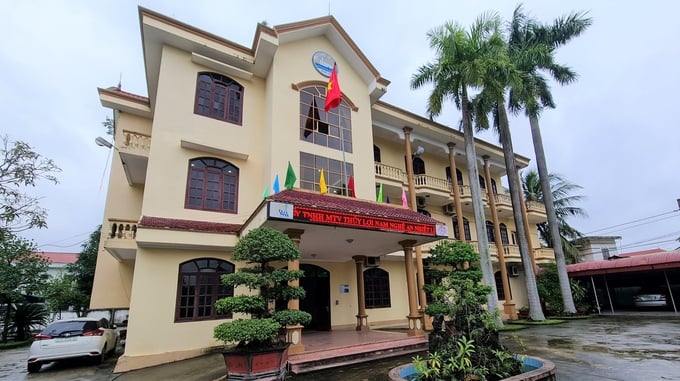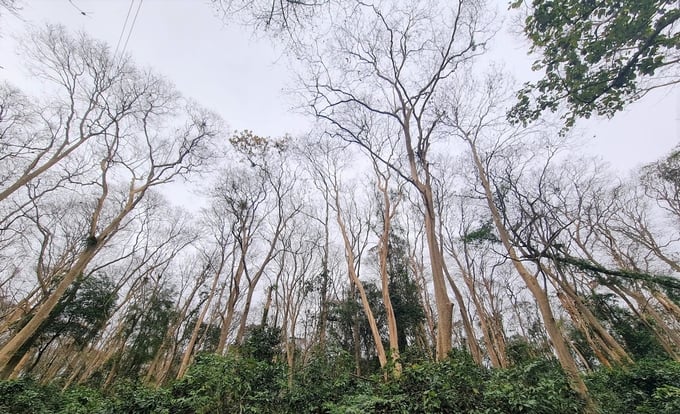May 16, 2025 | 10:00 GMT +7
May 16, 2025 | 10:00 GMT +7
Hotline: 0913.378.918
May 16, 2025 | 10:00 GMT +7
Hotline: 0913.378.918

Nghe An farmers benefit greatly from selling carbon credits from rice production. Photo: Viet Khanh.
Ms. Vo Thi Nhung, Deputy Director of the Department of Agriculture and Rural Development, emphasized: "Nghe An province possesses many potentials and advantages to create carbon credits in many aspects, not only in forestry but also in the field of crop production that is also worth being expected. Particularly, Nghe An's total rice area for spring and summer-autumn crops is up to 175,000 hectares, of which the land fund for proactive irrigation and regulation is over 80,000 hectares."
The sharing of the leader of the Nghe An agriculture and rural development sector is completely well-founded, because in the past 5 years, the agricultural industry of this province has maintained a successful momentum. Through results are achieved thanks to proactively building appropriate sowing plans combined with high-quality varieties and especially an extensive cultivation area.
The pilot implementation of "creating carbon credits in rice production" aims to trade and exchange greenhouse gas emission quotas. After "offsetting" domestic carbon credits, trading transactions will be transferred internationally, both contributing to significantly improving economic efficiency from the fields and opening up opportunities to find funding for reinvestment in production activities. The destination is to accelerate the development of Vietnam's carbon market. The favorable weather, favorable terrain, and harmonious people are all available, so Nghe An clearly has many opportunities to strive.
In the spring crop of 2024, this province sowed over 91,000 hectares of rice, with an excessively high yield of over 69 tons/ha at the end of the season. It is worth mentioning that the spring crop is also a milestone to recognize the starting step of Nghe An agriculture in the journey of "creating carbon credits in rice production," applied at the same time in five key districts of Nghi Loc, Hung Nguyen, Nam Dan, Do Luong, and Dien Chau.

Participating in the project on creating carbon credits from rice production helps irrigation businesses significantly reduce the burden that has been weighing on them for so long. Photo: Viet Khanh.
Previously, the Japan International Cooperation Agency (JICA) introduced Green Carbon Inc., a leading enterprise in the environmental field that specializes in creating and selling carbon credits in the domestic and international markets, to accompany Nghe An. Throughout the process of coordinating the implementation of the project on creating carbon credits, relevant parties have shown the necessary desire and seriousness.
The project has organized many seminars and inter-community cluster training classes to help thousands of agricultural irrigation workers, grassroots officials, and beneficiary farmers grasp the organizational process and method. The project also installed hundreds of water measuring tubes in the fields to ensure a number of representative samples and provide reliable data for monitoring and recognizing carbon credits.
Another core task is to accurately capture the number of watering times for comparison. Through monitoring in areas within the scope of the spring crop of 2024, it was found that subjects all followed the alternate wetting and drying irrigation technique well, basically applying it less than 5 times, which is much lower than in areas outside the project (ranging from 5.0 to 8.2 times). This means that the rice carbon credit project contributes to significantly reducing related costs, thereby bringing higher and more stable income to farmers.
In the spring crop of 2024, through the Nghe An project, 5,000 hectares of rice have been deployed; this number is extremely limited compared to the potential and existing advantages. In order to awaken the sleeping "gold mine," relevant parties have proactively promoted dissemination and encouraged subjects to register to participate. In the summer-autumn crop, the situation changed positively, reflected in the area of 11,600 hectares, an increase of nearly 8,000 hectares compared to the starting point.
Creating carbon credits in rice production not only brings joy to farmers but also helps irrigation businesses "throw away their worries." That is because the general situation in these units is very stagnant; the business and production process are not favorable, leading to low efficiency all the time.
For example, South Nghe An Irrigation Co., Ltd. is originally an agricultural irrigation unit assigned to manage an area of tens of thousands of hectares. Due to the specific terrain, most irrigation and drainage areas had to operate equipment instead of taking advantage of self-flow irrigation. Operating costs are increasing day by day, but irrigation fees have remained "unmoved" for more than a decade, causing the psychology of the majority to be seriously disturbed.
Now with carbon credits, from top to bottom, everyone hopes the situation will soon turn around. Mr. Ta Duy Hien, Deputy Director of South Vietnam Irrigation Co., Ltd., affirmed: "Many stakeholders will benefit from participating in the project, including agricultural irrigation companies. The project on creating carbon credits in rice production has just been implemented, but the initial signals are relatively positive, promising to create a strong breakthrough in the coming time."

Nghe An's forestry industry also earned hundreds of billions of dong thanks to the wide area of natural forests. Photo: Viet Khanh.
Meanwhile, the forestry sector is also worth being expected. Possessing 789,462 hectares of natural forest helps Nghe An earn over 280 billion VND from a greenhouse gas reduction payment agreement. This is not a small amount of money, both helping forest owners significantly reduce their professional pressure and creating great motivation for contractors to increase their responsibility to protect the forest.
Translated by Thu Huyen

(VAN) Cold-barn systems efficiently manage environmental and temperature conditions, which aids in the prevention of respiratory diseases in pigs and protects them from the vectors that transmit African swine fevers.

(VAN) To tackle challenges, the project 'Addressing key technical bottlenecks in the grouper supply chain in Vietnam' has been underway since 2024.

(VAN) The project 'Disease-Resilient and Sustainable Cassava Production Systems in the Mekong Region', funded by the Australian Center for International Agricultural Research (ACIAR), is being implemented from 2024 to 2028.

(VAN) Data from 10,000 farming households will help professionalize production organization and support the implementation of the One Million Hectares Program for High-Quality, Low-Emission Rice Cultivation.

(VAN) FAO Director-General QU Dongyu marks International Day of Plant Health at NENA conference.

(VAN) Deputy Minister of Agriculture and Environment Hoang Trung affirmed that floriculture and ornamental plants are a growing industry that receives significant global attention.

(VAN) The three staple crops dominating modern diets – corn, rice and wheat – are familiar to Americans. However, fourth place is held by a dark horse: cassava.